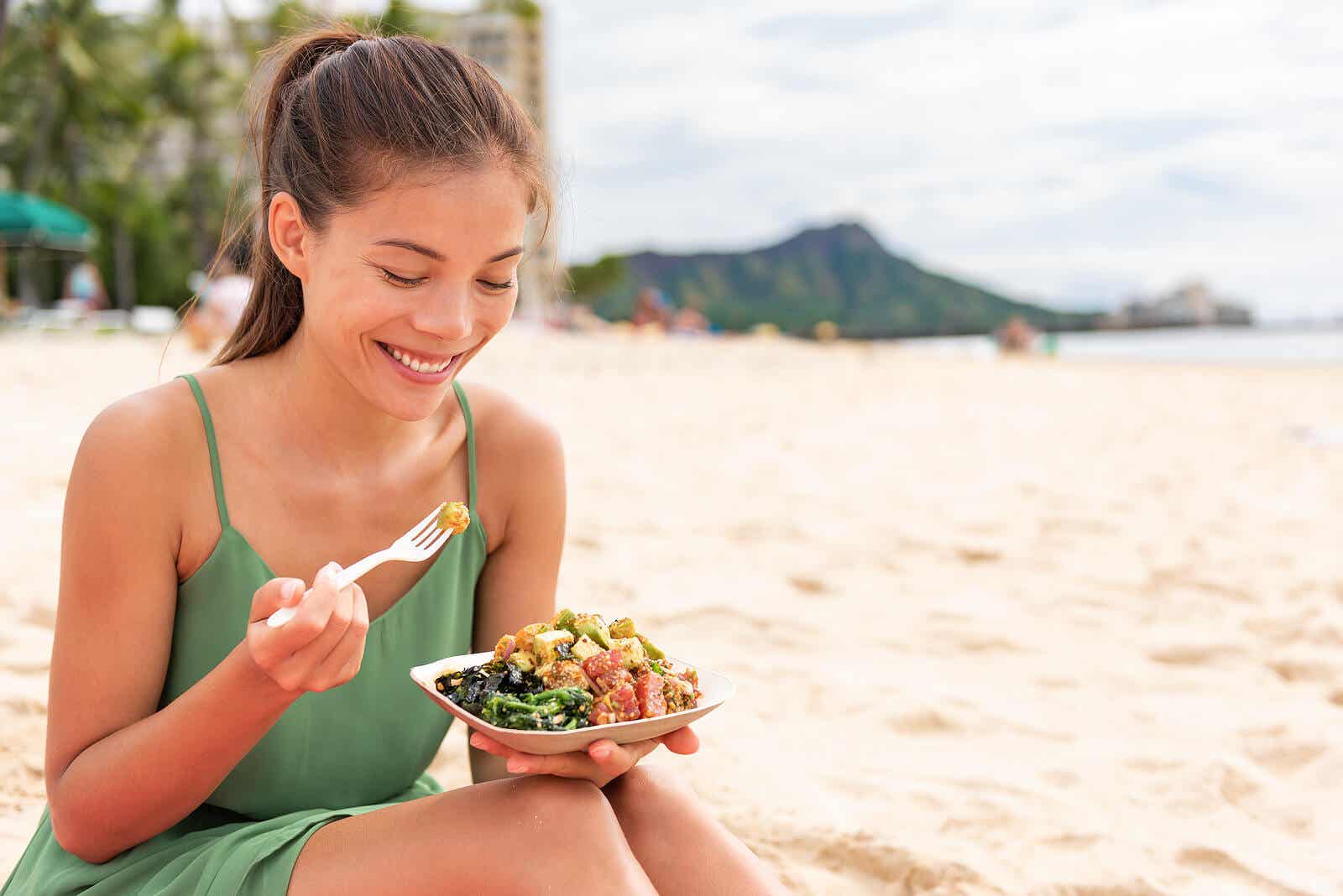How to Prevent Food Poisoning During Summer


Written and verified by the nutritionist Silvia Zaragoza
Food poisoning is a symptomatic disease caused by the ingestion or handling of food containing toxic substances. Did you know that with the arrival of heat, the risk of suffering from food poisoning increases? That’s why we want to advise you on how to prevent food poisoning during summer.
Keep in mind that it affects 600 million people worldwide, and it’s mainly caused by the consumption of fish and eggs. Moreover, remember the case of listeria that occurred last year due to shredded beef?
Furthermore, not only can this occur when eating out, but the majority of cases take place at home. Why? Due to the tendency to defrost food improperly, store in poor conditions, and transport from one place to another without respecting appropriate standards for each product.
It also concerns the preparation and subsequent conservation at the right temperature, as this is often underestimated, especially when taking food to the beach or to the pool. Do you want to know if you’re doing it right? Read on and find out.

Shopping without the risk of food poisoning
Even if it may not seem like it, it all starts with the purchase of the products from the market or supermarket. The first step is to decide the order in which we’re going to buy the food, starting with dry, followed by fresh, and, finally, frozen, to avoid losing the cold chain.
Moreover, if you’re a consumer of canned food, make sure that cans aren’t bulging and, in the case of vacuum-packed products, that they’re well sealed. Also, all foods should be labeled with the expiration date or best-before date and how to store them.
In addition, when you take your groceries home, put frozen foods in separate bags to keep them cold and try to hurry home.
Once you get home, store everything in its corresponding place in the refrigerator and freezer, which must be washed frequently. Remember that the refrigerator should be kept at 4ºC and the freezer at -18ºC.
We also advise you to place up front the food that expires soonest and to keep raw and cooked food in separate areas and protected in closed containers. You can consult the advice on how to store food in the fridge on the official government website for Northern Ireland.
Even when freezing, wrap the food in portions for consumption; dry it beforehand and label it with the name and date of freezing.
Four basic rules
The next step is to prepare the food for cooking and consumption. In this regard, we have the following four rules:
- Clean and disinfect. It’s important to wash your hands with soap and water before, during, and after handling raw food, going to the toilet, blowing your nose, etc. Do the same with utensils and surfaces. This rule is decisive in the case of raw fish, such as sushi and ceviche.
- Separate raw food from cooked food. Raw food has a higher water content, which makes it prone to the multiplication of pathogenic microorganisms. Although impossible to see with the naked eye, they’re always there.
- Cook well your food. This involves reaching temperatures above 65-70ºC.
- Cool as quickly as possible if not consumed immediately.
It’s necessary to defrost food in the fridge 24-hours before use. Avoid doing this at room temperature or under the faucet. Keep in mind to place the food in a container that allows the water to trickle out.
How to prevent food poisoning at the beach bar and on the beach?
Firstly, when you go to a restaurant, be cautious with meals that include eggs, especially if they’re raw. Make sure they used pasteurized eggs or are kept refrigerated and are fresh from that day. This is the case of mayonnaise and runny omelettes. It’s also a bad idea to consume raw meat or fish from ceviches or tartare with a strange taste or smell.
Secondly, if you take your lunch box to the beach, try to put it in a cooler and avoid raw eggs. If you like omelettes, try to cook them well and keep them cold. When preparing this dish, follow the hygiene rules explained in the previous section.
The importance of preventing food poisoning in summer
As you’ve seen, it’s very easy to get food poisoning due to the fact that food is prone to the development of bacteria and toxins. However, these intoxications can be avoided by following adequate hygiene, handling and storage guidelines. It’s important to take them into account both at home and outside.
To conclude, we want you to understand that pregnant women, children and the elderly are at a higher risk of experiencing food poisoning more severely. Although it usually causes nausea, vomiting, and diarrhea, it also affects the nervous system and could generate malformations and brain damage in the fetus and even death.
So, it’s essential to be careful while preparing food and when choosing what to eat in order to minimize the health consequences on the most vulnerable.
Food poisoning is a symptomatic disease caused by the ingestion or handling of food containing toxic substances. Did you know that with the arrival of heat, the risk of suffering from food poisoning increases? That’s why we want to advise you on how to prevent food poisoning during summer.
Keep in mind that it affects 600 million people worldwide, and it’s mainly caused by the consumption of fish and eggs. Moreover, remember the case of listeria that occurred last year due to shredded beef?
Furthermore, not only can this occur when eating out, but the majority of cases take place at home. Why? Due to the tendency to defrost food improperly, store in poor conditions, and transport from one place to another without respecting appropriate standards for each product.
It also concerns the preparation and subsequent conservation at the right temperature, as this is often underestimated, especially when taking food to the beach or to the pool. Do you want to know if you’re doing it right? Read on and find out.

Shopping without the risk of food poisoning
Even if it may not seem like it, it all starts with the purchase of the products from the market or supermarket. The first step is to decide the order in which we’re going to buy the food, starting with dry, followed by fresh, and, finally, frozen, to avoid losing the cold chain.
Moreover, if you’re a consumer of canned food, make sure that cans aren’t bulging and, in the case of vacuum-packed products, that they’re well sealed. Also, all foods should be labeled with the expiration date or best-before date and how to store them.
In addition, when you take your groceries home, put frozen foods in separate bags to keep them cold and try to hurry home.
Once you get home, store everything in its corresponding place in the refrigerator and freezer, which must be washed frequently. Remember that the refrigerator should be kept at 4ºC and the freezer at -18ºC.
We also advise you to place up front the food that expires soonest and to keep raw and cooked food in separate areas and protected in closed containers. You can consult the advice on how to store food in the fridge on the official government website for Northern Ireland.
Even when freezing, wrap the food in portions for consumption; dry it beforehand and label it with the name and date of freezing.
Four basic rules
The next step is to prepare the food for cooking and consumption. In this regard, we have the following four rules:
- Clean and disinfect. It’s important to wash your hands with soap and water before, during, and after handling raw food, going to the toilet, blowing your nose, etc. Do the same with utensils and surfaces. This rule is decisive in the case of raw fish, such as sushi and ceviche.
- Separate raw food from cooked food. Raw food has a higher water content, which makes it prone to the multiplication of pathogenic microorganisms. Although impossible to see with the naked eye, they’re always there.
- Cook well your food. This involves reaching temperatures above 65-70ºC.
- Cool as quickly as possible if not consumed immediately.
It’s necessary to defrost food in the fridge 24-hours before use. Avoid doing this at room temperature or under the faucet. Keep in mind to place the food in a container that allows the water to trickle out.
How to prevent food poisoning at the beach bar and on the beach?
Firstly, when you go to a restaurant, be cautious with meals that include eggs, especially if they’re raw. Make sure they used pasteurized eggs or are kept refrigerated and are fresh from that day. This is the case of mayonnaise and runny omelettes. It’s also a bad idea to consume raw meat or fish from ceviches or tartare with a strange taste or smell.
Secondly, if you take your lunch box to the beach, try to put it in a cooler and avoid raw eggs. If you like omelettes, try to cook them well and keep them cold. When preparing this dish, follow the hygiene rules explained in the previous section.
The importance of preventing food poisoning in summer
As you’ve seen, it’s very easy to get food poisoning due to the fact that food is prone to the development of bacteria and toxins. However, these intoxications can be avoided by following adequate hygiene, handling and storage guidelines. It’s important to take them into account both at home and outside.
To conclude, we want you to understand that pregnant women, children and the elderly are at a higher risk of experiencing food poisoning more severely. Although it usually causes nausea, vomiting, and diarrhea, it also affects the nervous system and could generate malformations and brain damage in the fetus and even death.
So, it’s essential to be careful while preparing food and when choosing what to eat in order to minimize the health consequences on the most vulnerable.
All cited sources were thoroughly reviewed by our team to ensure their quality, reliability, currency, and validity. The bibliography of this article was considered reliable and of academic or scientific accuracy.
- Generalitat de Cataluña. Enfermedades de transmisión alimentaria.
- AESAN (Asociación Española de Seguridad Alimentaria y Nutrición). (2020) Prevenir las intoxicaciones en verano.
- Agencia Catalana de Seguridad Alimentaria . Cuatro normas para preparar alimentos seguros.
- Generalitat de Cataluña. (2019) Higiene, conservación y preparación de alimentos.
- Agencia Catalana de Seguridad Alimentaria y Agencia Catalana de Consumo. Consejos para la preparación de alimentos con huevo.
- Beatriz Robles. (2020) Come seguro comiendo de todo. Editorial Planeta. España: 1ªEdición.
This text is provided for informational purposes only and does not replace consultation with a professional. If in doubt, consult your specialist.








